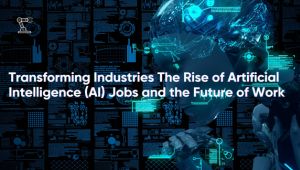Introduction
In the digital age, the technological landscape is constantly evolving, reshaping the way we live, work, and interact. Among the ground-breaking advancements, Artificial Intelligence (AI) has emerged as a transformative force, leaving an indelible mark on various industries. As we navigate the intricacies of this technological revolution, however, the rise of AI jobs is not merely a trend but a paradigm shift that promises to redefine the future of work.
The Rise of AI Jobs
Furthermore, AI has significantly impacted various industries, such as healthcare, finance, and transportation. In addition, it has revolutionized the way we interact with technology, making it more intuitive and responsive. Consequently, the potential for AI to continue shaping the future is immense.
From virtual assistants and chatbots to complex machine learning algorithms, AI is progressively infiltrating diverse sectors. This infiltration is not just about automation; However, it is also about the creation of new job opportunities. On the other hand, it is important to consider the impact on the economy. Additionally, the development of new technologies can also lead to increased productivity. In contrast, it is crucial to address any potential job displacement. Furthermore, it is vital to find ways to retrain and reskill workers for the changing job market.
Industries are increasingly leveraging AI to enhance efficiency, streamline processes, and unlock new possibilities. As a result, the demand for skilled professionals in AI-related fields is skyrocketing. Additionally, companies are competing to attract top talent. Consequently, job opportunities in AI are plentiful, and the potential for career growth is significant. Data scientists, machine learning engineers, AI researchers, and algorithm developers are becoming the architects of innovation, steering industries toward unprecedented heights.
AI is not a job eliminator; it’s a job transformer. Routine tasks that can be automated are being delegated to machines, freeing up human potential for more complex, creative, and strategic endeavors. Additionally, this shift is fostering demand for skills that complement AI technologies. Consequently, it is emphasizing essential traits such as critical thinking, problem-solving, and emotional intelligence.
The Future of Work
As AI continues to evolve, the future of work is poised for a significant overhaul. Traditional job roles will evolve, giving rise to hybrid professions that seamlessly blend human expertise with AI capabilities. Collaboration between humans and machines will become the norm, creating a synergy that amplifies productivity and innovation.
Moreover, the rise of AI is not confined solely to specific sectors. Industries ranging from healthcare and finance to manufacturing and education are experiencing transformative changes. AI is not just a technological upgrade; it’s a catalyst for reimagining business models and operational frameworks.

What Are The Career Opportunities In the AI Field ?
There are many lucrative career opportunities in the AI field and many exciting AI roles. Additionally, AI professionals work in nearly every industry, from health care to government to large and small tech companies. In addition, if you choose this career path, you can choose from a variety of AI jobs like:
- Machine learning engineer: A machine learning engineer designs, builds, and deploys powerful algorithms that learn from data to solve real-world problems.
- Data scientist: This data professional explores and analyses data sets to identify business problems, patterns, and trends, guiding informed decision-making and solving real-world problems. What kind of data does a data scientist collect? The possibilities in data analytics are endless.
- Software engineer: Software engineers create software applications, ensuring functionality, performance, and user experience.
- NLP engineer: An NLP engineer develops systems that understand and process human language, enabling computers to communicate and interact, e.g. virtual assistants and chatbots.
- Business intelligence developer: This professional creates tools and dashboards to turn raw data into actionable business insights.
- Robotics engineer: This engineer designs, builds, and programs robots and robotic systems to perform tasks in the real world.
- AI engineer: This engineer applies AI principles and techniques to develop intelligent AI systems and solve complex problems. There is a demand for this role in nearly every industry.
- AI research scientist: An AI research scientist pushes the boundaries of AI knowledge, exploring new algorithms, methods, and applications, developing new machine learning systems, and pushing the envelope of data analytics.
There is a huge demand for these roles across many industries. No matter which role you pursue, your job outlook will always be rosy if you choose this career path.
What Skills Do You Need To Land an Entry-Level AI Position?
Not all AI positions are the same. As you see from the list above, different roles might need different skills/experiences. However, nearly all entry-level roles will expect:
- Graduate degree in computer science, mathematics, or statistics
- Familiarity with Python and SQL
- Knowledge of data analysis, processing, and visualization
- Understanding of cloud technologies
- Business acumen about the industry, market, competition, etc.
How To Work in Artificial Intelligence?
A career in AI is unlike most technology jobs that are available today. As an evolving field, AI jobs demand professionals to stay informed of advancements and update themselves regularly. It is no longer enough to just gain skills, AI/ML professionals need to track the latest research and understand new algorithms on a regular basis.
Moreover, AI is coming under immense social and regulatory scrutiny. AI professionals need to look beyond just the technical aspects of AI and pay attention to its social, cultural, political, and economic impact.
Conclusion
In conclusion, the rise of AI jobs heralds a new era in the world of work. Moreover, rather than fearing automation, we should embrace the opportunities it presents. AI is not a threat to human employment; it’s a tool that empowers us to break free from the confines of routine and embark on a journey of creativity, innovation, and unparalleled collaboration.
As we navigate the transformative landscape of AI, upskilling and reskilling will be pivotal. The future belongs to those who can adapt, learn, and thrive in an environment where man and machine work in harmony. The rise of AI jobs is not just a shift in employment dynamics; Moreover, it’s a testament to our ability to evolve and shape a future where technology enhances, instead of replacing the human touch.

Niksh Digital Institute with mastery in Digital Marketing and it will help you gain expertise in various digital media aspects. Keyword Research, SEO, Social Media Marketing, Search Engine Marketing as well as Email Marketing, Affiliate Marketing, and Google Analytics.




